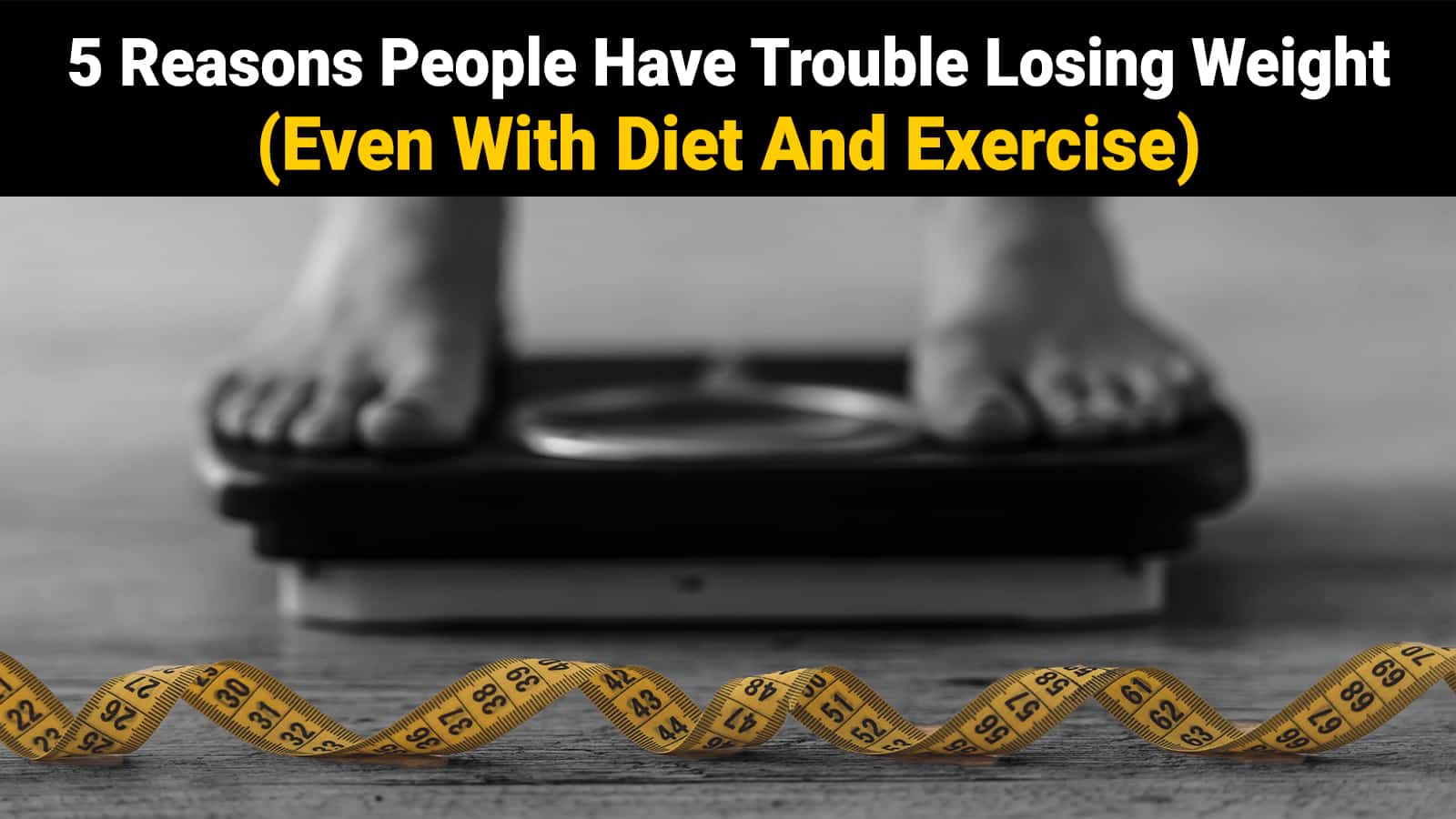You’re doing everything you can to lose weight. You’re on a diet. You exercise. You’ve followed all the instructions. But somehow, you’re still not losing weight the way you thought you would…
Why does this happen? There are plenty of things that may be stopping you from shedding the excess weight you so desperately want to lose. You may not even realize that you’re jeopardizing your efforts!
5 Reasons You’re Not Losing Weight, Even With Diet And Exercise
1. You’re Not Sleeping Enough
Sleep is restorative. It helps the body recover from the troubles of the day. It gives you energy, improves positive thinking, and betters your focus. Overall, it is great for mental and physical health all around.
Without enough sleep, you are automatically at a higher risk for obesity. You are also 55% more likely to wind up being overweight or obese! This is because you’re depriving yourself of all the positive benefits that come from a minimum of seven hours of sleep per night. (1)
Why does this happen? Well, the body’s natural cycle – or the circadian rhythm – is based on hormones that are regulated by sleeping times and mealtimes. As such, you need to have a regular daily routine in order for your body to respond correctly.
2. You Take Medication
Medications come with a whole host of side effects. Sometimes, those side effects involve your weight, fat storage, or metabolic rate. Here are some types of medications that may be giving you problems:
a) Antidepressants and Antipsychotics
Many medications related to mental health can lead to weight gain in general, often gathering around the belly. These types of drugs can also negatively affect the levels of insulin within the body, leading to insulin resistance and other issues.
Some antidepressants can even lead to excess food cravings, causing you to feel hungry when you don’t actually need to eat yet. Of course, each type of drug is different, so ask your doctor about side effects.
b) Migraine and Seizure Medications
These types of medications have a tendency to lower metabolic rates. This causes excess fluid to be stored within the body, and it can also make your appetite larger because it suppresses feelings of satiety. You may also experience heightened junk food cravings.
c) Steroids
Sure, we all know that menopause can lead to weight gain due to the hormonal imbalance. But taking steroids to balance out those hormones can be just as detrimental to weight loss efforts.
This causes a change in fat distribution, and it can even lead to fat buildup all over your stomach. Yikes! Of course, people use steroids for other medical purposes, too, but the end result is the same: it can lead to added fat around the gut.
This also includes corticosteroids, which are commonly used for muscle gain, or to bring down levels of inflammation and counter pain. These types of products can lead to increased appetite.
d) Allergy Relief
Allergy control medications that you can buy over the counter work by preventing histamines from overreacting and causing bad allergic reactions. What are histamines? – Special body chemicals designed to respond to allergens.
Unfortunately, histamine is actually fairly important for other bodily processes. As such, blocking its action can eventually cause weight gain.
e) Insulin
Did you know that insulin is technically a steroid? As such, it leads to added fat buildup and can even cause you to lose some of your muscle mass. It’s a complicated drug and can often cause weight gain because it causes the body to better absorb sugar in the blood in order to balance out blood sugar levels.
f) Beta Blockers
Beta blockers are endlessly crucial for those with heart disease. Unfortunately, it does so by lowering heart rate and blood pressure. This means that you don’t get the same benefits out of exercise as you would without this purposeful slowing. It can also lead to increased fatigue, which lowers your physical activity levels.
Remember, you should never stop taking prescribed medications without your doctor’s agreement, even if it’s preventing you from losing weight. Instead, talk to your doctor about alternatives that won’t give you these side effects.
3. Your Diet Isn’t Balanced Enough
Yes, you’ve been trying to eat healthily, and maybe you’ve made yourself a good meal plan that you believe works well. But not all diets are effective for everyone. Some may not even work for you at all while giving positive results to other people. Here are some areas of your diet to consider when you aren’t losing weight.
a) Too Many Carbs
Carbohydrates provide us with energy, yes. But too much of this component can actually make weight loss efforts much more difficult. Studies have revealed that low-carb diets can be up to three times more effective at aiding weight loss.
This is especially true if you have metabolic issues. Eating fewer carbs can also lead to better levels of blood glucose, cholesterol, and fat.
b) Too Little Protein
Many people believe that high-protein diets are just for bodybuilders or those hitting the gym, but this couldn’t be further from the truth! If around 30% of your allocation for calories is taken up by protein, you can actually greatly increase your metabolism.
In addition, protein can help you feel sated, preventing unwanted hunger and cravings throughout the day. It’s one of the nutrients with the most positive effects on weight loss, so don’t discount it! (2)
c) Your Drinks Have Too Much Sugar
Fruit juices, smoothies, diet sodas, and health-centric drinks are common go-to’s for those trying to lose weight, but they often contain a lot of sugar. Even sugar-free options can contain artificial sweeteners that wreak havoc on weight loss efforts. Stick to water and brewed tea!
d) Ignoring Whole Foods
Whole foods with just one ingredient are often countless times more healthy than foods that have been certified as “healthy” for any other reason. Don’t let companies preying on dieting culture fool you into believing a granola bar is healthier than vegetables or whole wheat bread!
e) You’re Eating Too Little
When you don’t get enough calories in a day, your body goes into starvation mode and begins stocking up on fat. This life-saving emergency bodily response works wonders in disaster situations, but for weight loss, it’s just not going to cut it. Make sure your calorie deficit isn’t below 400!
f) Eating Too Many Times In A Day
At some point, information began circulating that eating more meals in smaller portions helps increase metabolism. This couldn’t be farther from the truth, and research indicates that it doesn’t actually do anything good or bad for you.
In fact, intermittent fasting, a method that involves eating less and not consuming food for prolonged periods, has actually proven to be much more effective than multiple small meals.
g) Your Diet Has Stretched On For A Long Time
Have you been dieting for months and months? It’s time to take a break. Diets aren’t meant to be long-term options. They’re meant to help get you started as you incorporate more sustainable habits, like exercising, getting more sleep, and formulating better meal plans.
h) You Care Too Much About Dieting
As we said, diets aren’t meant to be long-term solutions. The longer you force yourself to diet, the more likely you will gain weight, according to research. Regular deprivation will not do you, or your body, any favors.
4. Your Workout Is Too Intense
Believe it or not, exercising too much can actually be just as harmful to your weight loss progress as not exercising enough. Why? Well, the body uses carbohydrates when you exercise, and only after it has burned off those carbs does it begin cutting down on fat.
What’s the problem with that, then? Many people engage in what is known as HIIT, or high-intensity interval training, to blast fat and burn excess calories. Unfortunately, these exercises are performed in very short bursts. This means you just have the time to burn away carbohydrate energy stores, not fat stores.
But fat also is much slower at releasing energy – more than twice as slow as carbs. As such, you can burn yourself out if you try to be intense for long periods of your exercise routine. Instead, take it slow and steady.
This type of exercise is called LISS, or low-intensity steady state. It is much gentler on the body, but it allows you to keep moving for long stretches of time, allowing your body’s energy burning to synchronize itself with the rate at which fats supply energy!
5. Pollution
Yes, surprisingly, pollution can have a severe effect on someone’s weight. Think about it – tiny bits of pollution in each inhalation; it’s not too out of this world to imagine that it builds up over time. Here are the two most difficult types of pollution that cause this:
a) Airborne Pollution
A study conducted in Beijing and published in the FASEB Journal back in June 2016 revealed that pollution leads to a variety of issues within the body, namely inflammation, and oxidative stress.
These, in turn, lead to issues such as metabolic conditions. This includes heart disease, type 2 diabetes, and even hypertension – and, naturally, these all make weight loss much more difficult.
b) Organic Pollutants
Studies have also found that the use of certain components known as POPs, or persistent organic pollutants, can cause increased weight with regular exposure. It may also cause other disorders, including glucose intolerance, insulin resistance, and, eventually, type 2 diabetes.
Unfortunately, avoiding pollutants is nearly impossible in today’s world. But don’t fret, and keep your positive thinking hat on. There are ways to combat the issues caused by pollutants. Avoiding meat and fish products can reduce your exposure to POPs; go for fiber-rich options instead. Some examples of safer foods are: (3)
- Fruits
- Vegetables
- Seaweed
- Tea
- Mushrooms
- Pulses
- Rice
- Nuts
In general, choosing organic food only decreases your risk of exposure to pesticide pollutants, which can also cause a variety of dangerous health conditions.
Final Thoughts On Some Reasons You’re Not Losing Weight Even With Diet And Exercise
Losing weight is an uphill battle, and it can be more difficult for some than others. The key is understanding that not all diets or exercise plans will work for you. By being aware of these 5 reasons you’re not losing weight, you’ll be able to make more intelligent and informed choices leading up to better, healthier, and more effective weight loss.


















